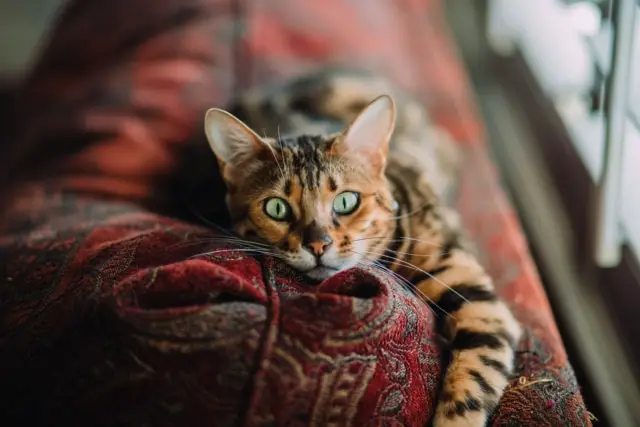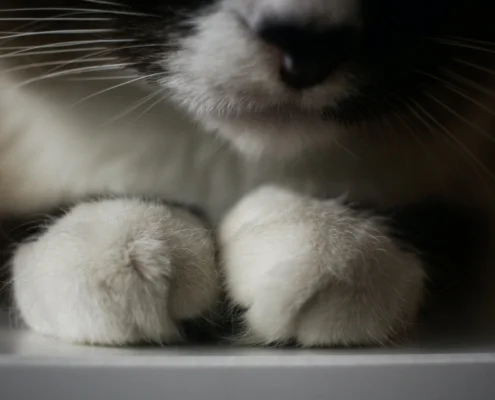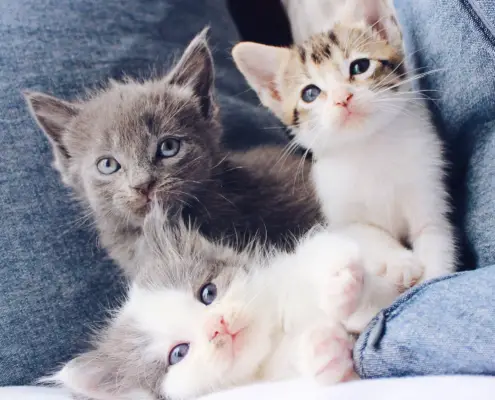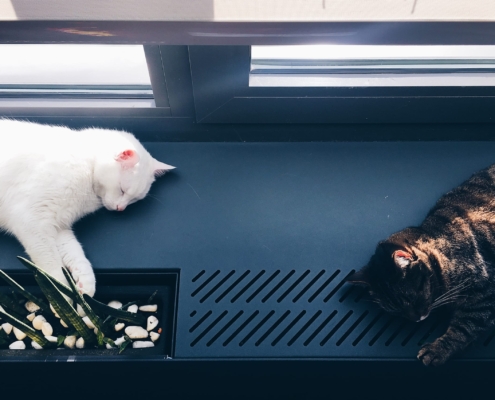
Heart problems can affect cats just as they do humans. As a responsible cat owner, it is crucial to be aware of the signs and symptoms of heart problems in cats, as well as the various types of heart conditions they may develop. By recognizing these problems early on, you can ensure your feline friend receives the necessary care and attention. In this article, we will explore the common symptoms, methods of diagnosis, management strategies, and preventive measures for heart problems in cats.
Common Symptoms of Heart Problems in Cats
Cats with heart problems may exhibit a range of symptoms. While some signs may be subtle, it is essential to pay attention to any changes in your cat’s behavior or physical condition. Common symptoms include:
- Coughing and wheezing: Persistent coughing or wheezing can be an indication of heart problems. If your cat experiences difficulty breathing or has a chronic cough, it is best to consult a veterinarian.
- Lethargy and weakness: Heart problems can cause fatigue and weakness in cats. If your usually active and playful cat becomes lethargic or tires easily, it may be a sign of an underlying heart condition.
- Loss of appetite and weight loss: Cats with heart problems may experience a reduced appetite and gradual weight loss. If your cat shows a lack of interest in food or experiences unexplained weight loss, it is important to investigate further.
Types of Heart Problems in Cats
There are several types of heart problems that can affect cats. The two most common conditions are:
- Hypertrophic Cardiomyopathy (HCM): HCM is the most prevalent type of heart disease in cats. It is characterized by the thickening of the heart muscles, which can impede blood flow and lead to various complications.
- Feline Dilated Cardiomyopathy (DCM): DCM is another significant heart condition in cats. It involves the enlargement of the heart chambers, reducing their ability to pump blood effectively.
While these conditions are more common, other heart problems, such as heart murmurs and arrhythmias, can also affect cats. Understanding the specific condition your cat may have is crucial for proper diagnosis and treatment.
Diagnosing Heart Problems in Cats
Diagnosing heart problems in cats requires a thorough examination by a veterinarian. The following diagnostic methods may be utilized:
- Physical examination: A veterinarian will listen to your cat’s heart using a stethoscope to detect any abnormal heart sounds or murmurs.
- X-rays and ultrasounds: Imaging techniques such as X-rays and ultrasounds can provide detailed images of your cat’s heart, helping identify any structural abnormalities or enlargement.
- Electrocardiogram (ECG): An ECG measures the electrical activity of the heart and can help detect irregular heart rhythms or abnormalities.
- Blood tests: Blood tests may be conducted to assess kidney and liver function, as well as to check for any underlying conditions that may contribute to heart problems.
Managing Heart Problems in Cats
Once a heart condition is diagnosed, it is essential to develop a comprehensive management plan to ensure your cat’s well-being. The following strategies can help manage heart problems in cats:
- Medications: Veterinarians may prescribe medications to improve heart function, reduce fluid buildup, or regulate heart rhythms. It is crucial to administer these medications as instructed and monitor your cat for any side effects.
- Dietary adjustments: Cats with heart problems may benefit from a specialized diet that is low in sodium and high in quality proteins. Consult your veterinarian for appropriate dietary recommendations.
- Exercise: While moderate exercise is generally beneficial for cats, it is important to avoid excessive physical exertion, especially for cats with heart conditions. Provide your cat with opportunities for gentle play and exercise, but always monitor their energy levels.
- Regular check-ups: Schedule regular check-ups with your veterinarian to monitor your cat’s heart condition and adjust the treatment plan if necessary. These check-ups may include physical examinations, blood tests, and imaging tests.
Medications and Treatment Options for Heart Problems in Cats
When it comes to treating heart problems in cats, several medications and treatment options are available. Some commonly used medications include:
- Angiotensin-converting enzyme (ACE) inhibitors: ACE inhibitors help dilate blood vessels, reduce fluid buildup, and improve heart function.
- Beta-blockers: Beta-blockers can help regulate heart rhythms and reduce the workload on the heart.
- Diuretics: Diuretics help remove excess fluid from the body, reducing the strain on the heart and improving breathing.
In some cases, more advanced treatment options such as surgery or cardiac pacemakers may be necessary. However, the most suitable treatment approach will depend on the specific heart condition diagnosed by your veterinarian.
Diet and Exercise for Cats with Heart Problems
Maintaining a proper diet and exercise routine is crucial for cats with heart problems. A balanced diet that is low in sodium and contains high-quality proteins can help manage heart conditions. Additionally, providing opportunities for gentle exercise and play can help keep your cat active and maintain their overall well-being. However, it is important to consult your veterinarian before making any dietary or exercise changes to ensure they are appropriate for your cat’s specific condition.
Preventing Heart Problems in Cats
While some heart conditions in cats may be genetic or congenital, there are steps you can take to reduce the risk of heart problems or delay their onset. Consider the following preventive measures:
- Regular veterinary check-ups: Regular check-ups allow your veterinarian to monitor your cat’s heart health and detect any potential issues early on.
- Maintain a healthy weight: Obesity can contribute to heart problems in cats. Ensure your cat maintains a healthy weight through a balanced diet and regular exercise.
- Avoid smoking: Research suggests that secondhand smoke can negatively impact cats’ heart health. Avoid smoking in your home or around your cat to reduce their exposure.
- Reduce stress: Stress can have adverse effects on a cat’s overall health, including their heart. Create a calm and enriching environment for your cat to minimize stressors.
Support and Resources for Cat Owners with Cats with Heart Problems
Caring for a cat with heart problems can be emotionally challenging. It is essential to seek support and resources to ensure you can provide the best care for your feline companion. Consider the following options:
- Veterinary specialists: Consult with veterinary cardiologists or specialists who have expertise in treating heart conditions in cats.
- Online communities: Join online communities or forums where cat owners share their experiences and offer support and advice.
- Educational resources: Stay informed about the latest developments in feline cardiology by reading books, articles, or attending webinars on the subject.
Remember, you are not alone in this journey. Reach out for support and guidance to ensure your cat receives the best care possible.
Conclusion
Heart problems in cats are not uncommon, and early recognition and management are essential for your cat’s well-being. By familiarizing yourself with the symptoms, diagnostic methods, treatment options, and preventive measures discussed in this article, you can take proactive steps to guard your cat’s heart health. Remember to consult with your veterinarian for personalized advice and guidance regarding your cat’s specific condition. With your love and care, you can provide a happy and healthy life for your feline companion.
If you enjoyed my article, I would appreciate you sharing it with your network.

Sima Ndlebe
Sima writes for CatBuzz. He is interested in Cats, Health and Fitness, and Entrepreneurship.
Published: 12 October 2023
Related Articles
Disclaimer
The content found on CatBuzz.org is presented on an "as is" basis and is intended for general consumer information and education purposes only. Any utilization of this information is voluntary and solely at the user's own risk.
None of the articles or content should be regarded as, or used in place of, veterinary medical advice, diagnosis, or treatment. The information provided on the website is purely for educational and informational intentions and should not be considered a substitute for professional guidance from a veterinarian or other qualified expert. The articles are designed to inform consumers about veterinary healthcare and medical matters that may impact their cat's daily life. It should be noted that this website and its services do not constitute the practice of any form of veterinary medical advice, diagnosis, or treatment. CatBuzz.org explicitly disclaims any liability for any direct or indirect damages or losses that may arise from the use of or reliance on the information contained within the content.
Consumers must consult a veterinarian, veterinary specialist, or another qualified veterinary healthcare provider when seeking advice regarding their cat's health or medical conditions. It is important not to ignore, avoid, or postpone seeking medical advice from a veterinarian or other qualified veterinary healthcare provider solely based on information obtained from this website. If you believe that your cat may be experiencing a medical issue or condition, it is imperative to promptly contact a qualified veterinary healthcare professional.



